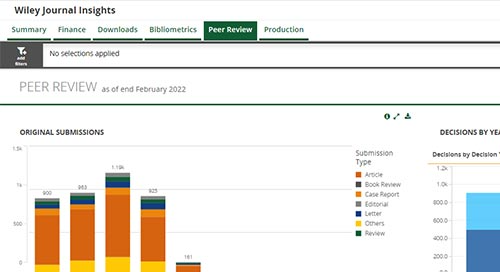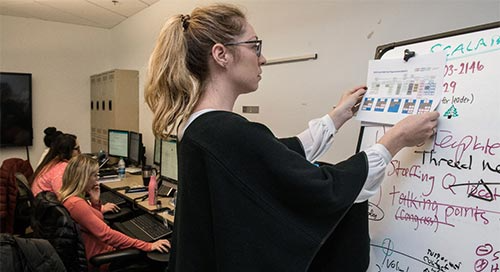is-the-impact-factor-still-the-paragon-for-journals-how-societies-play-a-leading-role-in-bringing-about-responsible-research-assessment
July 06, 2022

The month of June is typically a time of anticipation for many journals. The build-up to the JCR release date keeps editorial and marketing colleagues on their toes, while editors and society partners wait with bated breath to see how their journal has performed in the rankings.
This year will be a bit different. A couple of months ago we became a DORA (Declaration on Research Assessment) signatory, which signaled our commitment to DORA principles and its goal to support fair, equitable, and responsible research assessment practices. DORA’s guiding principle is that research assessment should be based on a holistic approach. This involves moving away from journal-based metrics—specifically the Journal Impact Factor—as the sole measure of quality and impact. With this in mind, one of the first ways we can all make an impact is to adopt a more balanced approach to the 2021 JCR release.
What role do societies play?
Societies have been involved in this movement from the beginning; the principles outlined in the Declaration were conceived at an American Society for Cell Biology meeting in 2012 and many societies have since joined as independent signatories. Professional societies have an important role to play, as organizations that support early career researchers, professional development and career advancement for members and the broader subject community. Individual society members can influence research assessment practices at the institutional or funder level while the society journal, annual meeting, and educational platforms play a leading role in setting the tone for the industry and the community.
Approximately 60% of the journals published by Wiley are owned, or joint-owned, by a professional society or association. Many of our society partners have already endorsed DORA principles and have been working to support responsible research assessment practices for several years. We recognize that change does not happen overnight and that attitudes toward the Impact Factor are deeply rooted in our perception of a journal’s quality. That said, a singular focus on the Impact Factor can also lead to a biased perception of the quality of the author’s research and subsequently limits the utility and application of alternative tools that can be used to measure the impact of their individual work. In partnership with you, and with the guidance of DORA, we can adopt responsible research assessment practices on society-owned journals and provide access to alternative measures of impact.
What is Wiley doing to support DORA principles on our platform and through author service?
We are developing a diverse range of metrics and tools which provide authors, and those who are in a position to assess their performance, with a holistic and well-rounded view of the impact of their work. This means expanding the range of journal-based and article-based metrics we make publicly accessible, to include not just citation impact but usage, re-use, media references, peer review performance, geographic demographics, and more. We currently support the following initiatives, some of which are currently in a pilot phase, with the goal to add more over time:
• Raise public awareness to support diverse measures of impact
• Provide Altmetric Attention Scores for all journals
• scite smart citations
• Amplify and acknowledge individual author contributions via CRediT
• Support equitable and fair research assessment practices and impact tracking via Transparent Peer Review, Publons
• Provide opportunities for publication of sound science results via Refer & Transfer to expand publication opportunities for all authors, including ECRs
• Support preprinting, including Under Review on Authorea to provide authors with increased opportunities to gain recognition and reward
• Media toolkit for authors
What can societies do to support DORA principles?
Through the recognition of individual scientific or medical contributions, societies play a key role in helping researchers and clinicians advance their careers. In particular, societies are in a unique position to support DORA’s fifth principle: “For the purposes of research assessment, consider the value and impact of all research outputs (including datasets and software) in addition to research publications, and consider a broad range of impact measures including qualitative indicators of research impact, such as influence on policy and practice.” Society-led activities enable authors and researchers to gain recognition and reward in ways that aren’t centered on publication in journals with a high IF and ranking.
All of the following activities should be recognized as supporting responsible research assessment practices. By promoting them and calling attention to the ways in which they highlight individual contributions, we can also counterbalance marketing of the journal IF and ranking and other journal-based metrics:
• Journal marketing via society communication channels, including society newsletter, annual meeting, and other outlets. Instead of promoting the IF and ranking alone, consider the following alternatives:
o include the full suite of available journal metrics and article-level metrics—such as Altmetric scores, usage, geographic distribution of author base, and peer review turnaround times—in addition to Clarivate and Scopus metrics, to highlight the impact of the author’s work, not just the citation impact of the journal as a whole
o include a list of abstracting and indexing services where the journal is included to demonstrate subject coverage and emphasize the external validation of the journal’s quality control measures
o list the journal’s open science or open research initiatives including preprinting, data sharing, registered reports, transparent peer review, CRediT, sound science policy (if relevant), and others. These initiatives recognize individual contributions and mitigate the potential for fraud and bias in the assessment process. They also provide opportunities to publish the full spectrum of research artifacts from any given study
• Continuing education credit and professional training:
o highlight educational and training opportunities that provide complimentary career and professional development opportunities, alongside the journal publication route
• Promote publication outputs and presentation outlets that acknowledge individual contributions e.g. abstracts, posters, oral presentations
• Host publishing workshops for ECRs and others that educate on the value of scope, audience, and individual articles metrics rather than a singular focus on getting published in the highest-ranked IF journal
If you'd like to consider the impact and value of becoming an independent signatory of DORA, visit the DORA website for more information.













